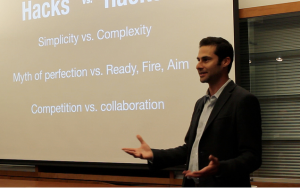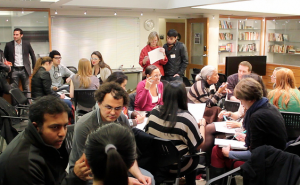
Journalists and technologists, working together as one. At least, that’s what Storify co-founder Burt Herman hopes to see.
Herman is the creator of the new-media meetup group “Hacks and Hackers,” and on Thursday he came to Stanford’s Entrepreneurship Week to talk about the changing media landscape. The term “hacks” refers colloquially to journalists, while “hackers” refers to coders or technologists.
“People are generating so much media, that it’s just this amazing amount of information – it’s a flood,” said Herman, a former Stanford Knight Fellow and Associated Press reporter. “You know it’s this never ending real-time stream, that all of us are kind of seeing every day.”
View more photos from the Hacks and Hackers event >>
Speaking to an audience of journalists, computer scientists, and business students in McClatchy Hall, Herman said the next generation of the web is about organizing all “this stuff that’s out there.” People have addressed this, he said, by both aggregation and curation.
“I think really what curation means is it’s something that humans do. It is thinking like a museum exhibit,” he said.
Curation is a central theme at Herman’s San Francisco-based startup, Storify, which lets users bring posts from across various social media sites together into easy-to-read timelines.
Anyone can use the platform on the web, and in February, Storify launched its first iPad app. Many news organizations create Storify stories and embed them on their sites as well. (See example.)
Herman compared the ink in newspapers to code on the web.
“The media organizations are realizing they need to hire technologists,” he said. “Technology organizations are realizing they need to hire journalists.”
Bringing those two groups together is the goal of Hacks and Hackers, which started with one meetup in San Francisco over two years ago. Today, there are Hacks and Hackers meetups in many cities, Herman said. The meetup events host everything from training sessions to “hackathons,” attempts to collaboratively solve some tricky problem.
“It’s really just an idea that’s spread on it’s own, because I think people are hungry for something bringing these ideas together,” he said.

Herman admits there are some challenges between journalists and hackers. For example, journalists have traditionally worked in a competitive space, while hackers have been collaborative, he said. While journalists simplify ideas for the general audience, hackers usually like more challenging or complex problems, he added. But despite the differences, Herman sees important similarities.
“They both really see their work as art,” he said. “Great writing is obviously a beautiful thing to read, and great code—I mean in its own way—written elegantly, is also something that is to be appreciated.”
We are growing up in a new age of media opportunity, Herman said.
“I think is an amazing time where people can build new things and reach mass audiences and work together in new ways,” he said.
The event, moderated by Stanford Graduate Program in Journalism Director Ann Grimes, ended with a ‘design school’ style exercise. Attendees were divided into groups and practiced redesigning the morning news experience. Project ideas included creating a smart phone app that could summarize course readings for busy college students and a tablet app that could toggle between giving news in standard paragraph form, text that automatically scrolls across a screen or text read by a Siri-style robot voice.
Stanford Entrepreneurship Week 2012 takes place February 27 through March 7. This collection of over 30 events is hosted by the Stanford Entrepreneurship Network (SEN), a federation of programs, student groups and organizations supporting entrepreneurship in the Stanford community. For a complete listing of events check: https://sen.stanford.edu/e-week/calendardu/e-week/calendar
